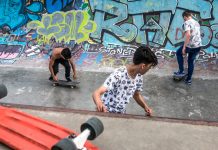

City 01 Skate Days, 2019. Skatepark Monte Tossal (Castillo San Fernando). Alicante. Spain. Two skaters & Three skateboards
In the study of Beal and Weidman, the authors were able to identify two core values that support the skateboarding culture. The first one was labeled as «Participant control», and relates to the small level of formality that the skateboarding culture reflects. This enables a feeling of freedom, making it possible to express themselves and to embrace skateboarding as being part of their identity.
The second value relates to skateboarding being embraced as a noncompetitive activity. It is this last value that sets skateboarding apart from mainstream sports, because even in the professional skateboarding sphere, riders demonstrate signs of passion and happiness, and although it is an individualistic sport, skateboarders support each other when for instance someone lands a trick.
Quote. Paulo Miguel Pereira Baumhammer. «Four wheels and one board: studying the skateboard tribe and thei loyalty towards skateboard brands», 2013













